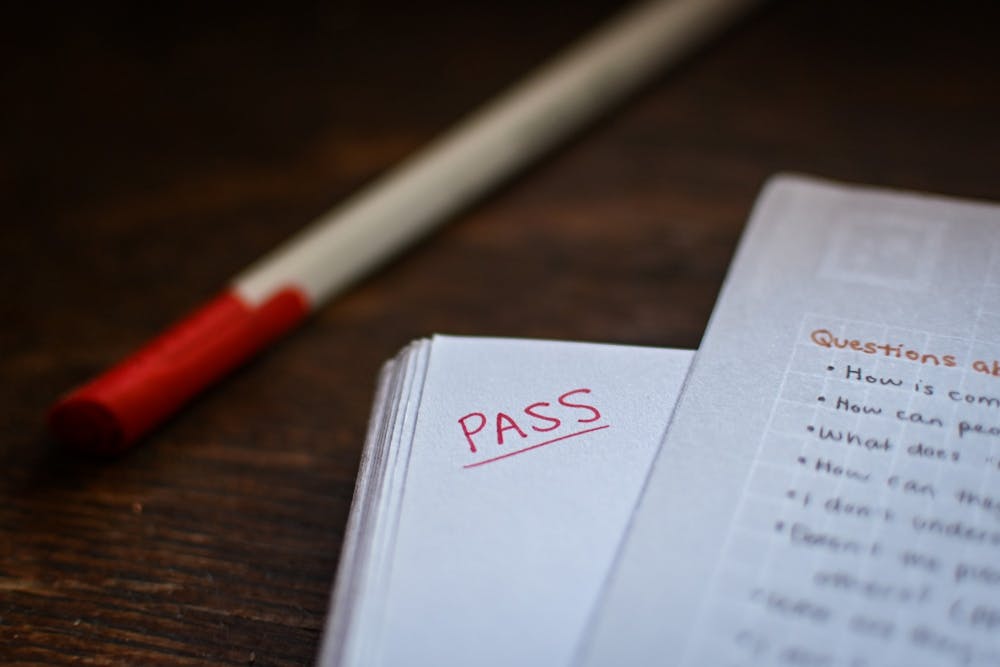
I was wrong, thank goodness. In my previous column, I wrote that I didn’t think Penn would trust us to return to campus and respect a campus compact, so I was excited when I read the email announcing the “hybrid” fall semester. While the important words were there – “in-person,” “participating in student clubs,” “housing available” – some less-prominent decisions have stirred debate. One disappointing choice was the return to normal letter grading. While certainly understandable, this is not in the best interest of students. Penn should return to an optional pass/fail (p/f) system for the fall semester.
To provide justification, I think it best to reconstruct the argument for p/f grading from the spring. In one of the first emails detailing our new reality, dated March 20, Provost Wendell Pritchett said “remote learning and the stresses of this unexpected global situation” are the reasons “all students [have] the option to choose how to handle their grades this semester.” Very understandable reasoning.
Following up on April 9, the Provost made the logic even simpler: “we know that many challenges still lie ahead. That is why we are providing these expanded academic supports for all undergraduates this semester.” While some argued that the “optional” component stigmatized choosing pass/fail, I read no comments saying Penn should have stayed at letter grading only. But going to letter grading now implies that the situation must have changed and that the conditions which warranted the original decision have improved.
Well, not exactly. Though the pandemic is no longer “unexpected,” it certainly is still causing stress. And no one who trusts science would contest that “challenges still lie ahead.” In fact, based on student sleuthing, it looks like Penn’s instructors have decided to make the upcoming semester almost totally remote, à la spring. Little has changed, so why remove the optional p/f system?
There is also something a bit malicious with requiring normal grading. If students are unable to secure a quiet workplace to conduct a semester's-worth of work, then they’re not able to produce their best work. Of course, Penn is happy to try and accommodate students on campus, but that comes with a $11,000+ price tag. To its credit, the University appears to be working diligently to ensure FGLI students are supported. If COVID-19 continues to worsen, as it has been, then students may be forced to leave campus in the middle of the semester as they did in the spring. But Penn can’t accommodate everyone now because they didn’t in the spring.
Bringing back p/f could be seen as a way for students to get an easier semester. That’s not flawed logic. After all, that’s why many student organizations have test banks and the implicit directive for students is to get as much done in as little time possible. But let’s not forget that this same mentality applies to the University. There are no tuition decreases, no administrative pay cuts, and only small increases in endowment spending. An easy way to approach uncertain times.
Seeing an expanded p/f system as a departure from the integrity of the education Penn provides is a logical argument, but there are actually a number of distinguished universities – MIT and Swarthmore, among others – which would contest that, even in normal times. At Swarthmore, all first-years’ first semester classes are taken p/f (or credit/no-credit, as they call it). One administrator said the option allows students to be “more focused on the learning rather than grade achievement.” If it works there, why can’t it work here?
Probably the answer, like so many things at Penn, is culture. Some students will undoubtedly slack off, as they do any semester. But using grades as a way to force academic rigor is flawed, especially during a pandemic. The fall semester’s details are not set in stone so it’s not just for Penn to give us emailed support and tell us to buckle down. Standard grading is designed for normal times, and these are not normal times. The strength of our optional p/f system from last semester was that it suited the newness of the pandemic. It must return again for the fall.
The one-size-fits-all approach is simply wrong. So again we turn to the words of Wendell Pritchett: “we are confident that our great Penn faculty, staff and students... are mutually committed to supporting each other.” As we, the students, pledge to sacrifice our social life for social distancing, a small step in mutual support is an option to pass/fail our classes.

ALFREDO PRATICÒ is a rising sophomore in the College from Philadelphia studying history and sociology. His email is pratico@sas.upenn.edu.
Have opinions of your own you would like to share? Submit a guest column.
The Daily Pennsylvanian is an independent, student-run newspaper. Please consider making a donation to support the coverage that shapes the University. Your generosity ensures a future of strong journalism at Penn.
Donate







